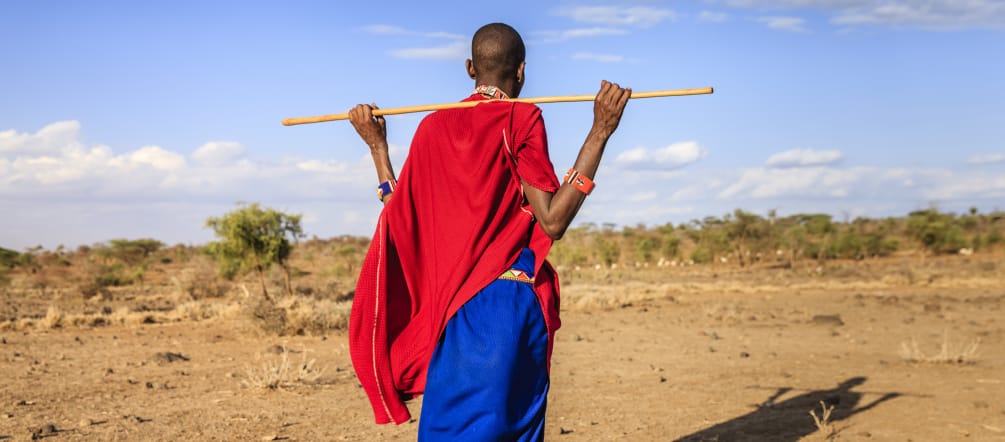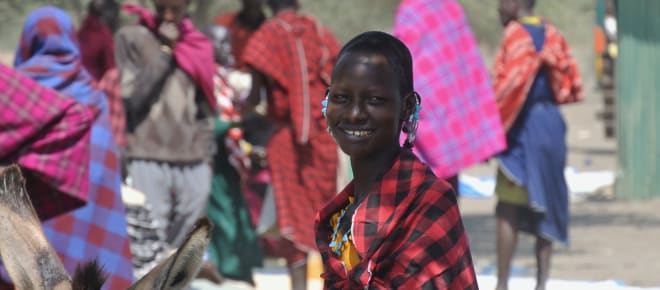
Tanzania: stop the eviction of the Maasai from Ngorongoro!
Tanzania’s Ngorongoro Crater is renowned the world over for its wildlife and as the home of the indigenous Maasai people. To promote tourism, the government wants to enlarge the protected area – and evict more than 80,000 people, mostly indigenous Maasai. We cannot accept gross human rights violations under the guise of conservation.
News and updatesTo: Lazare Eloundou Assomo, Director, UNESCO World Heritage Center; Samia Suluhu Hassan, Her Excellency the President of the United Republic of Tanzania
“Stop the eviction of the Maasai people under the guise of conservation.”For generations, the indigenous Maasai people have lived alongside the rich wildlife of Tanzania’s Ngorongoro and Serengeti. With their way of life – mainly animal husbandry and agriculture for self-sufficiency – the semi-nomadic pastoralists have preserved nature and acted as the guardians of the savannah.
Thanks to its largely intact nature, UNESCO declared the Ngorongoro Conservation Area (NCA) a World Heritage Site in 1979. But while environmentalists and travelers celebrate the NCA for its biodiversity, the Maasai face untold hardship: their homeland is about to be taken away from them and their livelihoods destroyed under the guise of conservation.
Following criticism of the state of the World Heritage Site in an inquiry initiated by UNESCO, Tanzania’s government has prepared a land use model and resettlement plan that would trample the rights of the local people: The package would enlarge the territory in which the Maasai are not allowed to graze their cattle, cultivate crops or settle.
More than 80,000 people are to be displaced, writes the Oakland Institute in its study, "The Looming Threat of Eviction". 42,000 are expected to leave the NCA “voluntarily” because of their precarious living conditions – yet the government has contributed to this very poverty.
The Maasai warn that the plans will exacerbate dispossession, malnutrition and hunger.
While the measures are to be realized under the pretext of nature conservation, the Oakland Institute states that the real reason is to generate more revenue from tourism.
The Maasai and other residents are calling on President Samia Suluhu Hassan to drop the plans to evict them. Now they are asking for international support.
The protection of human rights and the conservation of nature are not mutually exclusive. Please sign our petition and speak out for the Maasai.
In an April 2021 “Statement on the Fate of People Living in the Ngorongoro National Park,” the pastoral communities living in the NCA called on President Samia Suluhu Hassan to take immediate action. Their demands begin with the halting of the implementation of the MLUM and resettlement plan. It also calls for the resignation of both NCAA Conservation Commissioner Dr. Freddy Mangogi and the Minister of Tourism and Natural Resources, Damas Ndumbaro; establishment of a judicial committee to investigate the injustices, brutality, and human rights violations driven by these departments; and creation of a new “independent and participatory commission,” comprised of ecology experts, human rights activists, and NCA residents, “in an equal ratio.” The commission will then work to “recommend the best way forward to develop the area improved livelihood of the communities in the manners that both the area’s ecology, wildlife and pastoral livelihoods will be developed.”
The PINGOS Forum, representing over 50 civil society groups of pastoralists and hunter-gatherers, echoes many of these calls. In addition to lifting of grazing, cultivation, and housing restrictions, a 2021 report from PINGOS calls for increased representation of Maasai in NCA decision-making bodies and a higher proportion of tourism income to be allocated to the residents.
These calls are rooted in the past experience of dealing with a government that has failed to respect the rights of the Indigenous time and time again. Following violent government-led evictions of Maasai villagers in the Loliondo region from their legally registered land in August 2017 which left 5,800 homes damaged and 20,000 homeless, four impacted Maasai villages sought recourse against the government – perpetrator of these abuses – in the regional East African Court of Justice (EACJ). In September 2018, EACJ granted an injunction prohibiting the government from evicting communities, prohibited the destruction of Maasai homesteads and the confiscation of livestock on said land, and banned the office of the Inspector General of Police from harassing and intimidating the plaintiffs, pending the full determination of their case. Despite the injunction, intimidation and threats made by the government have continued.
To: Lazare Eloundou Assomo, Director, UNESCO World Heritage Center; Samia Suluhu Hassan, Her Excellency the President of the United Republic of Tanzania
Your Excellency,
Ladies and Gentlemen,
The Ngorongoro Conservation Area (NCA) is a national treasure and has been preserved and protected by the residents in the region for centuries. Due to the outstanding natural and cultural value of the NCA, it was declared a UNESCO World Heritage site in 1979 and 2010 respectively.
This status comes with big responsibilities for the Tanzanian government – and profound threats to the local population, mainly the Maasai Indigenous peoples. Despite centuries of sustainable stewardship by Maasai pastoralists, current restrictions imposed on them have led to widespread poverty and hunger. At a critical moment where action to alleviate the suffering of the Maasai is urgently needed, international conservation agencies and the Tanzanian government continue to move in the wrong direction.
In 2019, a joint monitoring mission report from the UNESCO World Heritage Centre, the International Union for the Conservation of Nature (IUCN), and the International Council on Monuments and Sites (ICOMOS) stated: “The NCA [Authority] urgently needs to implement stringent policies to control population growth and its subsequent impact on the OUV [outstanding universal value]”i and called on the Tanzanian government to “complete the Multiple Land Use Model review exercise and share the results with World Heritage Centre and Advisory Bodies to advise on the most appropriate land use model, including in the matter of settling local communities in protected areas.”ii
In response, the Tanzanian government has advanced a multiple land use management (MLUM) and resettlement plan that proposes the eviction of more than 80,000 men, women, and children, while imposing restrictions that threaten the very survival of the remaining Maasai within the NCA. Further restrictions will worsen hunger and starvation for Maasai pastoralists, destroy livelihoods, and increase poverty. The Looming Threat of Eviction, a report by the Oakland Institute, describes the situation in detail.
The complicity of the UNESCO World Heritage Centre in guiding this plan is in violation of several covenants of the United Nations pertaining to human rightsiii and runs counter to UNESCO’s own constitution. Allowing Indigenous rights to be violated in the name of conservation demonstrates a blatant disregard for the historical wrongs inflicted upon the Maasai, the internationally recognized rights of Indigenous Peoples, and the fact that the protection of human rights is essential for conserving nature.
Therefore we support the call of the local communities within the NCA and ask that the UNESCO World Heritage Committee and Tanzanian government work together to:
- Stop forthwith this plan to move a legion of pastoral communities from Ngorongoro, given that Ngorongoro is their ancestral land and they have not done any degradation for many centuries and will not do so in the near future.
- Permanently cancel the eviction and demolition orders for people’s homes, government schools, health centers, village offices, houses of worship, and police stations, scheduled by the Ngorongoro Conservation Area Authority in April 2021, that are currently suspended until further notice.
- Take emergency steps – in collaboration with Ngorongoro pastoralists – to avert the hunger disaster by lifting current restrictions on where livestock can graze and access water and allow subsistence cultivation.iv
- Form a judicial committee to investigate injustices, brutality and human rights violations for more than six decades now.
- Form an independent and participatory commission, comprised of experts in ecology and wildlife, human rights activists, and the local residents in an equal ratio, tasked to go through all challenges and recommend the best way forward to create a plan that ensures the area’s ecology, wildlife, and pastoral livelihoods.
- If the UNESCO World Heritage Committee cannot compel the Tanzanian government to implement the aforementioned recommendations, Ngorongoro should be delisted as a World Heritage Site until the government can ensure the rights of Indigenous residents are respected.
As the continued survival of the Maasai within the NCA is at stake, we urgently call on the UNESCO World Heritage Committee and Tanzanian government to ensure the demands from Indigenous communities are met, as a first step towards a future management plan that respects nature and the rights of Indigenous Peoples alike.
Yours faithfully,
_______________________
i - Moukala, E., Taruvinga, P., Zulu, T. Report on the Joint WHC/ICOMOS/IUCN Mission to Ngorongoro Conservation Area, United Republic of Tanzania. UNESCO World Heritage Centre, International Council on Monuments and Sites (ICOMOS), International Union for the Conservation of Nature (IUCN), March 2019. p. 27. https://www.oaklandinstitute.org/sites/oaklandinstitute.org/files/pdfpreview/unesco-nca-report.pdf (accessed April 14, 2021).
ii - Ibid., p. 38.
iii - For example, the International Covenant on Economic, Social, and Cultural Rights (ICESCR) and United Nations Declaration on the Rights of Indigenous Peoples (UNDRIP).
iv - Including, but not limited to, lifting restrictions on pastoralists accessing Ormoti crater, Embaakai crater, Oldupai Gorge, Lake Ndutu Basin, Masek everglades and the Northern highland forest.

Tanzania’s government recently attempted to strip over 100,000 Maasai living near the Ngorongoro Crater of their right to vote, a move widely seen as a strategy to force them from their ancestral lands. After widespread protests, the government swiftly reversed its plans. Reports suggest that schools and health services, which had been neglected, are now slated for restoration.
Numerous Maasai people have been injured by security forces in Tanzania. The indigenous people are resisting government plans to expel them from their traditional land for a safari and hunting tourism scheme.
In Tanzania, the situation for the pastoralist Maasai people is coming to a head: Plans by the authorities to evict tens of thousands of people are taking shape. Nature conservation is being used as a pretext for a move that is intended to promote tourism.
In addition to the UNESCO World Heritage Center, the International Union for the Conservation of Nature (IUCN) and the International Council on Monuments and Sites (ICOMOS) participated in the study and support its proposals to the government.
The area of the protected area is to be enlarged from 8,100 to 12,000 square kilometers. Nine existing settlements are to be cleared.
The Oakland Institute writes that instead of recognizing the impact grazing and cultivation restrictions have inflicted on NCA residents and the health of the NCA, the plan doubles down on constraining livelihoods to create more “volunteers.” With restrictions on cultivation and grazing, NCA residents are left with little choice but to “volunteer” even if plans detailing where they will go remain light on details.
The Oakland Institute writes: "The evictions and restrictions constraining tens of thousands of livelihoods are not about ensuring conservation but about expanding tourism revenues within the World Heritage Site. Tourism within the NCA has exploded in recent years with the number of annual tourists increasing from 20,000 in 1979 to 644,155 in 2018 making it one of the most intensively visited conservation areas in Africa."